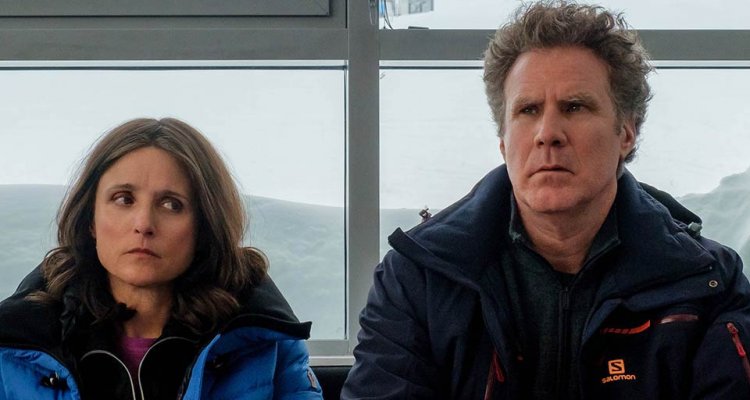Nat Faxon and Jim Rash’s “Downhill” begins — as its inspiration, Ruben Östlund’s “Force Majeure,” did before it— with the taking of a family vacation photo. It’s an appropriate metaphor for the story that follows because any photo—especially the family vacation photo—is a case of presentation; this is the image we’re going to pretend is representative when, in fact, it took all sorts of pushing and prodding and passive-aggression to create that split second where everyone seems to be having a great time. We’ll carry this with us, this snapshot, and forget all the other stuff. Usually.
READ MORE: Here Are Our Most Anticipated Films from the 2020 Sundance Film Festival
But not this time. Billie (Julia Louis-Dreyfus) and Pete (Will Ferrell) are on vacation in the Austrian Alps with their two sons, planning to do a lot of skiing and drink a lot of cocoa. And then, on the second day, a controlled avalanche near their resort gets, well, out of control, and there’s a moment of genuine panic and fear. And Pete just runs away, abandoning his wife and their boys without thinking twice. That’s his natural response.
READ MORE: ‘Downhill’ & The 100 Most Anticipated Films Of 2020
Billie doesn’t take it well. A silence descends on their interactions, a thick silence, hanging heavily, that very special silence that follows a genuine, no-bones-about-it screw-up. (You know that silence. Don’t play like you don’t.). Pete tries to fill it with small talk and little jokes, but the silences only grow more deafening; they’re going to have to deal with this, this… thing. And boy does he not want to.
READ MORE: The 25 Best Films Of 2019 You Didn’t See
Pete’s desperate attempts to avoid being alone with his wife (and thus having this most uncomfortable of conversations) means they end up hashing it out in front of, basically, strangers, poking each other in front of others, doing the one thing you’re never supposed to do in a marriage: let the cracks show. He mounts a weak defense; he argues with her version of events. (She marches their kids out like expert witnesses — and isn’t proud of it, but it had to be done.) He starts saying things like “we got over it” and “we got through” — trying to use language to will this thing into the past. And as the long days of this ostensibly relaxing vacation roll by, it becomes clear that this snap decision, considered for a fraction of a second if at all, could break this union entirely.
READ MORE: 52 Films Directed By Women To Watch In 2020
Louis-Dreyfuss not only stars in but produces, and it’s not hard to guess why. It’s a role that affords her to the opportunity to play to her strengths (nobody delivers lines through gritted teeth better) while expanding her toolbox — watch how she leans into the character’s horniness, without overplaying it. Ferrell is, at first glance, just doing a curdled, slightly defanged variation on his blowhard dad, but he’s digging for something deeper here, playing a drinking binge (and the rambling confession after) as sad rather than funny.
READ MORE: The 25 Best Movies Of 2020 We’ve Already Seen
They’ve got an easy, unforced vibe, and their comic rhythms — especially early on, when the characters are in sync — complement each other nicely. Supporting players are hit and miss, but Zach Woods is very good (and finds an entertaining variation on his stock character) while Miranda Otto is uproarious, pushy, funny, and wildly inappropriate.
The key question, though, is why they’ve gone to the trouble of making “Downhill,” when “Force Majeure” is readily available (now streaming on Hulu!) and not exactly an impenetrable piece of work. The politest approach is to recall Cameron Crowe’s definition of his 2001 film “Vanilla Sky,” which he defined less as a remake than a “cover” — a very Cameron Crowe thing to do, but we got what he meant. It’s certainly a more charitable term, particularly when Rash and Faxon not only replicate scenes and interactions but also the locked-in, semi-sterile visual style of Östlund’s original.
Somewhat predictably, their script (written with Jesse Armstrong) sands off some of the rougher edges and darker undercurrents of the original film, in favor of broader gags and a tidier ending. This will surely disappoint admirers of “Force Majeure,” but look, folks, this is why they do this kind of thing; foreign filmgoers and mainstream moviegoers aren’t entirely distinct entities, but when you’re aiming for the latter, you let go of some subtleties. The value of “Downhill” comes from merging this story with these two distinct comic personas, and seeing what they do with it (and each other). That’s probably not enough of a reason for it to exist. But it’s not nothing, either. [B-]
Follow along for all of our coverage from the 2020 Sundance Film Festival here.

